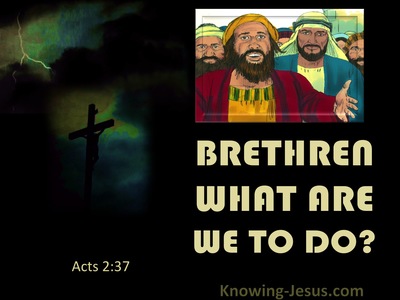◄ What Does 2 Peter 3:16 Mean? ►
as also in all his letters, speaking in them of these things, in which are some things hard to understand, which the untaught and unstable distort, as they do also the rest of the Scriptures, to their own destruction.
2 Peter 3:16(NASB)
Verse of the Day
The one thing that so many Bible expositors fail to do is to teach the Scriptures literally, grammatically, historically, and in context. What is the topic under discussion? Who spoke the word or penned the sacred text, and to whom is a particular passage addressed, and why?
In this final letter just before his death, the aged apostle Peter wrote to all Christians: "To those who have obtained like precious faith with us by the righteousness of our God and Saviour Jesus Christ."
Peter's letter was addressed to the Body of Christ, and in this final passage he addresses the 'Day of the Lord'. He was writing of the final 1007 years of earth's history, before the creation of a new heaven and a new earth.
Like all of Christ's disciples, Peter started following the Lord at the start of Christ's ministry when Jesus was teaching the lost sheep of the house of Israel, that the kingdom of heaven was near. He announced that the time of their visitation had arrived, and that He was their Messiah and King.
But from the moment that Israel's leaders accused Jesus of healing the sick in the power of Satan, His focus changed: "He began to speak in parables." Jesus started to prepare His little band of followers for His forthcoming betrayal, crucifixion, and Resurrection. He started preparing them for "the dispensation of the grace of God," when they would be made "ministers of a New and better Covenant."
He started to open their understanding of the future Church age: "A mystery that had been hidden for ages and concealed from past generations," but which was revealed to Paul and the other apostles, where Jew and Gentile would become One Body in Christ.
Peter had to make a huge adjustment from being a devout Jew who lived under the Law of Moses, to becoming a mature member of the Body of Christ who lived by the Law of the Spirit of Life in Christ Jesus. At times, he found the dispensational adjustment difficult, and in Galatians, we read that Paul found it necessary to challenge Peter's behaviour because he had started to revert back to Jewish exclusivism by segregating himself from Gentiles.
And here, at the end of an immensely illuminating passage on the entire 'Day of the Lord' which extends from the start of the 7-year Tribulation (Daniel's 70th week), through the 1000 year Millenium, to the destruction of this earth by fire and the creation of a new heaven and earth, we read that the great apostle Peter refers to: "Our beloved brother Paul," and the wisdom and understanding bestowed on him.
Although Peter admitted that some of Paul's writings were difficult to understand, he endorsed all his epistles and the doctrine he taught. However, he warned that there were many untaught and unstable people who distorted Paul's doctrine, twisted his teachings, and perverted many other passages of prophetic Scriptures, through wilful ignorance or deceptive practices.
It appears that as Peter shared his final thoughts in his last epistle, he called to mind the many truths that his beloved brother Paul taught so thoroughly about the Rapture, the resurrection of Church age saints, the Bema seat judgement of Christ, and the sudden destruction that falls on an unbelieving world, at the start of the 'Day of the Lord'.
Peter had just reminded us in this passage, that this 'Day' would come: "Like a thief in the night." He no doubt recalled Paul's description of the 'Day of the Lord', when sudden destruction would come on earth as unsaved people were calling 'peace and safety', and he would no doubt reflect on the many Old Testament passages that call this great and terrible Day as the 'Time of Jacob’s Trouble' and the 'Millennial rule of Christ', when the wolf will lie down with a lamb.
In consideration that the context of this passage is the 'Day of the Lord', and that Peter immediately draws our attention to the wisdom and understanding of "our beloved brother Paul," who spoke so frequently of this future time, should we not be very careful to study the teachings of Paul, seeking out the truth in these matters? Should we not also seek out all Old Testament references about this 'Day' and distance ourselves from untaught and unstable people who distort doctrine and twist the truth of God's holy Word to their own destruction?
My Prayer
Heavenly Father, thank You for the writings of Peter, Paul, and all holy men of God who wrote the Scriptures. Thank You that You have given us all we need to live godly lives and to understand the times in which we live. Give me greater insight into those Bible passages that unscrupulous and ignorant men like to distort and twist, through their own pride, ignorance, or lack of diligent study. I pray that I would not be swept along by false teachings but become increasingly grounded on the Word of truth. This I ask in Jesus' name, AMEN.
Choose a Verse from 2 Peter 3
2 Peter 3:16 Further Study
- 2 Peter 3:16 in the Parallel Bible
- 2 Peter 3:16 in the Thematic Bible
- 2 Peter 3:16 Cross References
- 2 Peter 3:16 Treasury of Scripture Knowing
- 2 Peter 3:16 Sermons
- 2 Peter 3:16 Prayers
- 2 Peter 3:16 Images
- 2 Peter 3:16 Devotionals
- Choose Chapter
Never miss a post















